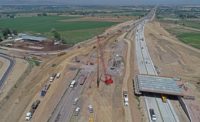Whether dreaming up new designs for a school building, water treatment plant or park project, Colorado engineering firm JVA Inc. has spent the past 64 years applying the kind of outside-the-box thinking that benefits clients who seek their help—even during a pandemic.
“We fully involve the staff in a continual process of innovation and improvement,” says Kevin Tone, JVA president. “We like to hang our hat on some of those new ways of doing things.”
As a result, forward-thinking concepts are embedded into nearly all the firm’s projects, which include K-12 and higher-education facilities; health care; municipal, state and federal projects; historic preservation; forensic engineering; site design; stormwater collection; municipal infrastructure; parks; sports fields; hospitality; residential; and water and wastewater treatment plants.
Each project also includes some level of sustainable and low-impact design. For example, a JVA designed membrane bioreactor is being constructed for the new visitor’s center atop Pikes Peak, at an elevation of 14,000 ft. Only the second of its kind in Colorado, this innovative water-saving technology allows wastewater to be recycled for non-potable uses within the building.
In Erie, Colo., JVA installed a centrifuge in the town’s water treatment plant to dewater plant solids so they could be hauled off in smaller quantities.
JVA’s 120-person staff is spread across its three distinct divisions—civil, structural and environmental—based out of offices in Boulder, Denver, Fort Collins, Winter Park and Glenwood Springs. The firm reported 2019 revenue of $18 million, up from $15.6 million the previous year.
With a broad range of projects in the $50,000 to $100-million range, about half of JVA’s portfolio is comprised of institutional and municipal work, particularly schools, libraries and recreation centers.
“We work with projects that require more complex design, and it’s more gratifying work,” says Charlie Hager, vice president of JVA’s civil engineering division. “K-12 and higher-ed work inspires us. It’s our claim to fame.”
JVA recently completed design of the new Severance High School on Colorado’s eastern plains and has more than a dozen other school projects underway across the state. The largest of those include two new schools in the Poudre Valley School District, one with a stadium and an athletic facility.
A new building that will replace Greeley West High School expands its capacity to 1,800 students from 1,000. The team also is working on additions and modifications to many Boulder Valley schools, some originally designed by JVA in the 1970s, and the firm recently finished an innovative aerospace building for the University of Colorado Boulder.
“The school district community is a tight-knit community, almost like a small family,” says Tom Soell, JVA vice president and head of its structural division. “It’s a big piece of our work, and we take a lot of pride in that.”
Preserving History
While K-12 and higher-ed work helped build JVA’s reputation, historic preservation and national park projects are what set it apart from other firms.
“JVA is one of a few firms in the West with a department dedicated to preservation work,” says Nan Anderson, principal with Anderson Hallas Architects, a frequent JVA collaborator. “Most structural firms will treat a historic building like they treat any other, whereas JVA really understands the art of possibility.”
A project for Boulder’s Chautauqua auditorium in the 1970s was a jumping off point for the firm’s historic preservation work, which has evolved to encompass more than 150 projects for the National Park Service in more than 50 parks across the country.
“We fully involve the staff in a continual process of innovation and improvement.”
– Kevin Tone, President, JVA Inc.
In 2017, JVA and Anderson Hallas completed a 140,000-sq-ft renovation of the Many Glacier Hotel in Glacier National Park, a huge project that spanned 13 years. The 100-year-old hotel, designed with structural steel, wood and masonry, was bolstered to withstand larger seismic forces, and site improvements were made throughout the property.
JVA also worked with Anderson Hallas to reconstruct the wildfire-damaged Sperry Chalet in Glacier. Built in 1913 and accessible only on foot, the project required 200 loads delivered by mule team and 500 helicopter flights to bring materials and crews into the site.
JVA’s youngest department, its environmental team, has played a key role in the firm’s growth, expanding to 35 people from four in the past 10 years. “We’re reaching a point of critical mass, where we can do any project of any size for any client,” says Josh McGibbon, vice president of JVA’s environmental engineering division. He says the environmental team is in a good position to weather any type of slowdown because of the nature of its work. “Everyone needs drinking water, uses wastewater. Maintenance needs and state and EPA [Environmental Protection Agency] regulations don’t stop,” he says.
JVA frequently works with smaller to midsize communities across the state. For instance, the firm spent three years helping the small town of Fleming, Colo., secure grant funding and loans for a $3-million project that featured a 35-acre evaporative lagoon.
JVA also serves as town engineer for some smaller municipalities such as Idaho Springs, Colo. The town is tucked into a canyon along Interstate 70, where space is a premium, so when Idaho Springs needed to expand its wastewater treatment plant, JVA had to get creative. The result is an activated granular-sludge treatment process—the first of its kind in Colorado and only the third in the country. JVA worked with the state to get the new technology approved, and construction should wrap up by the end of the year.
Pandemic Pivot
In 2019, JVA increased staff in all of its major disciplines and completed facility expansions in three of its five Colorado offices, doubling the size of its downtown Denver office. In December, JVA acquired Denver-based consulting engineering firm Structural Consultants Inc. (SCI), rounding out senior staffing needs in Denver.
But when Colorado’s governor imposed stay-at-home orders in mid-March, JVA, like the rest of the world, had to quickly adapt, and its 120 employees have been hunkered down at home, working remotely.
“We hire for the long term and hope they retire here.”
– Tom Soell, Vice President, JVA Inc.
“Our team is used to working on the road from our laptops. It’s not uncommon to drive nine hours for a two-hour meeting,” says McGibbon. “Because many of our clients are rural, and not used to a lot of the technology, we are teaching them about virtual meetings. It’s saving us a tremendous amount of time—and saving our clients money.”
Tone says the experience of working remotely is leading the firm to look at new ways of operating, even after it’s safe to reopen offices.
JVA’s broad range of projects and disciplines has helped it weather economic downturns in the past, and Soell says this bodes well for the current crisis. “Our [structural] department’s projects have already been funded with bond money. We had a tremendous backlog going into the pandemic,” he says.
“The municipalities that have dollars to spend want to be sure they spend it so it’s not taken away, [but we expect] the next round of budgeting will be much tougher.”
Staying Power
“We have an amazing synergy between our three divisions and our admin group,” says Hager. “We share projects across all five offices, [and] this enables us to adapt to clients’ needs by having all our staff connected and balancing the workload.”
The firm’s stock bonus plan makes everyone an owner, and Soell, who has been with JVA for 41 years, says this helps explain the low staff turnover and, in turn, lends itself to consistency and great client relationships. “We hire for the long term and hope they retire here,” he says.
Now, with everyone working remotely, the company-wide baseball games, ski trips, hut trips and brewery tours have been put on hold and replaced with weekly virtual happy hours to keep people connected. JVA recently picked up the tab for each employee’s family to have a restaurant meal delivered from a small business of their choice.
“Their staff are the kind of people that any mother would be proud of,” Anderson says. “They bring a spirit of fun to their work. Work is so much more than running calculations; it’s about building stories and adventures together.”








